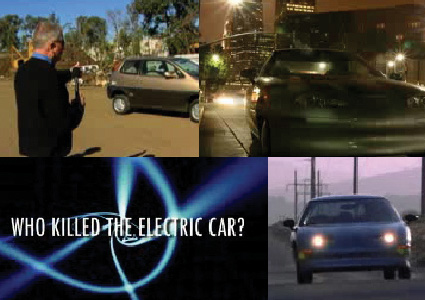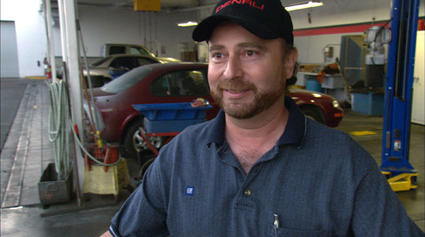You don't have to spend much time talking with Chelsea Sexton to realize she is passionate about electric vehicles. Sexton has been part of the EV debate that started in the 1990s with the debut of General Motor's first mass-production all-electric vehicle, the EV1. Sexton worked for GM, leasing the EV1 to customers and working on marketing strategies, until late 2001, when she was laid off and GM stopped the EV1 program. The EV1's story is told in the new film "Who Killed The Electric Car?", which features Sexton and others talking about the strange fate of the cars that were once hyped by Hollywood stars, then found a fanatic consumer base, and are now out rusting in the desert. Sexton found time for an exclusive Q&A with AutoblogGreen.
ABG: Do you think "Who Killed The Electric Car?" accurately portrays the EV1 story?
Sexton: I do, actually. I've been really proud of Chris [Paine, director] and Dean [Devlin, executive producer]. That is part of what has enabled all of us to have a good level of trust going into it because it is their story, too. The director and the executive producer were both drivers of these cars [EV1s]. We knew they'd do right by the story. I've been really impressed with how well Chris told that complex story in a precise and compelling way.
ABG: How did you get involved in the film?
Sexton: (laughs) I leased them their cars. I've known Chris for about nine years and I actually leased Dean his car but also his father Don Devlin was one of my very first drivers, the guy to whom the film is dedicated. In some ways, Don is responsible for our ability to tell the story with such accuracy because he was, from the very beginning, saying the auto companies do not want to do this and he made us pay attention all along. It was very rewarding to get to tell the story for Don in the end.
ABG: There is a scene in the film where you go see an EV1 in an underground parking garage, I think in a car museum. Is this the last EV1 in existence?
Sexton: No. There are about 40 that GM gutted and donated to museums and universities, basically in an effort to get some brownie points in the end, I guess. The Peterson [Automotive Museum] got one of them. Another one that is kind of making a lot of waves right now is the one in the Smithsonian because they got the only intact car, but they just removed it from display. The Washington Post wrote a big article on it a few days ago. The other interesting component is the wing that the EV1 sits in was paid for by General Motors. GM donated $10 million to the museum and now, on the eve of the film coming out, they remove the car. There's no conspiracy theory involved, but it certainly is a big coincidence.
ABG: The films shows there was quite an activist movement to save the EV1, and you were part of this group. How should activists approach such battles in the future?
Sexton: I think, more and more, it's imperative that consumers ask for what they want and not settle for the status quo. Part of that comes from having worked within the industry and I know how it works. The typical industry model for automotive is, "We're gonna build something and convince the customer that they want it" not, "Let's ask them what they want and build it." This is one of those cases where this was absolutely been proven. Just last year, as a good little example, Life and Times [Los Angeles-area PBS show] did a story on auto enthusiasts and they went to Hummer and to Prius and they came to us last at the vigil. While they're setting up we were just chatting, and they said, "We just went to Toyota and we asked them about all this grassroots demand for plug-in hybrids and the Prius seems like the obvious first car to start with and people are making them in their garages. Why don't you build a plug-in Prius?" and they said, "Because we don't have to. So many people are buying the gas-burning version we don't need to build anything else." That's sort of the perfect distillation. As long as we buy what they're making, they won't make anything else. It is necessary that consumers get involved, whether that's protesting or grassroots pressure or simply voting, not just politically but with your wallet and not buying something that isn't truly what you want. We have to get involved if we're going to end up seeing in the showrooms the cars that we really want to drive. Because that's what it's about in the end. It's not about, Oh my gosh, this one little car. It's about the choice that consumers have been denied. I'd never tell a Hummer driver that, "You can't have the choice to drive a Hummer." Choice is one of the cornerstones that we hold up as an American value. Similarly, we want the same choice, to drive something cleaner, especially something that has been proven to be viable in the market.

ABG: And people were interested in driving the EV1. Was this because it was a zero-emission vehicle?
Sexton: People buy cars for different reasons, many of them emotional. A lot of reasons people buy products in general are not necessarily the most logical on paper arguments. But there is absolutely a segment of folks who want a car that is clean or a car that is smooth and quiet, or a car that doesn't pollute or a car that doesn't rely on the Middle East. I mean, if you as Jim Woolsey [former head of the CIA, currently a partner in Booz Allen and works with Set America Free and Plug-In America, where Sexton is director] why he wants one of these cars, it has nothing to do with the environment. He's an environmentalist, but that's not his primary motivation. It's all about domestic energy. There are more and more, as time goes on, all kinds of varying reasons why people like these cars, which is what makes it such a common ground, technologically.
ABG: The movie ends by showing the plug-in hybrid as the next best car. What do you think the future of electric cars will be in America?
Sexton: I think for pure electrics, the next stage is going to come out of the smaller companies, the Teslas of the world. That car is wicked fun to drive; it's a very cool little car. In terms of the major automakers, I see them first going to plug-in hybrids, partially because there is a very broad market for it and partially simply because it's not a purely electric car and there is such an emotional fight right now. The more we want them the more they're not going to make them and it's almost come down to that particular fight over principle. So they are more likely to make plug-in hybrids, and that's fine. In our experience, the best way to get people to use less oil is to give them the option to use none, even if that's just for twenty or forty miles a day. That still gets most people through their daily commute and when you need to go further you have that back-up tank that you can put gasoline in, and eventually we'll be putting ethanol in or biodiesel or something else. I'm fine with the plug-in hybrid. I don't see it some sort of compromise in a bad way.

ABG: What kind of car do you drive?
Sexton: I drive a Saturn. I've had about eight of them. I won't buy a hybrid, so I drive a good little economical gas car, as little as possible and I won't buy another car until I can buy one with a plug on it. Mostly, it's just what working in the industry and watching what we were showing and then watching the sort of diluted products that we came out with. I use the analogy of accepting Cs from your kids when you know they can get As. In the case of the Prius, paying thirty grand for that C? I'll wait until there's a plug-in hybrid available or an electric car.
ABG: Finally, who do you think killed the electric car?
Sexton: No single snowflake in an avalanche feels responsible. I certainly think that some foes played a bigger role than others, but I don't think that any one of those suspects could have done it alone. It's a matter of a confluence of events and people, industries and companies acting in their own best interests and people not asking enough questions. Also there was a certain amount of complacency. I don't have just one suspect. I know some folks do, but having been in the middle of it, I know it took more than one.
ABG: Do you think "Who Killed The Electric Car?" accurately portrays the EV1 story?
Sexton: I do, actually. I've been really proud of Chris [Paine, director] and Dean [Devlin, executive producer]. That is part of what has enabled all of us to have a good level of trust going into it because it is their story, too. The director and the executive producer were both drivers of these cars [EV1s]. We knew they'd do right by the story. I've been really impressed with how well Chris told that complex story in a precise and compelling way.
ABG: How did you get involved in the film?
Sexton: (laughs) I leased them their cars. I've known Chris for about nine years and I actually leased Dean his car but also his father Don Devlin was one of my very first drivers, the guy to whom the film is dedicated. In some ways, Don is responsible for our ability to tell the story with such accuracy because he was, from the very beginning, saying the auto companies do not want to do this and he made us pay attention all along. It was very rewarding to get to tell the story for Don in the end.
ABG: There is a scene in the film where you go see an EV1 in an underground parking garage, I think in a car museum. Is this the last EV1 in existence?
Sexton: No. There are about 40 that GM gutted and donated to museums and universities, basically in an effort to get some brownie points in the end, I guess. The Peterson [Automotive Museum] got one of them. Another one that is kind of making a lot of waves right now is the one in the Smithsonian because they got the only intact car, but they just removed it from display. The Washington Post wrote a big article on it a few days ago. The other interesting component is the wing that the EV1 sits in was paid for by General Motors. GM donated $10 million to the museum and now, on the eve of the film coming out, they remove the car. There's no conspiracy theory involved, but it certainly is a big coincidence.

ABG: The films shows there was quite an activist movement to save the EV1, and you were part of this group. How should activists approach such battles in the future?
Sexton: I think, more and more, it's imperative that consumers ask for what they want and not settle for the status quo. Part of that comes from having worked within the industry and I know how it works. The typical industry model for automotive is, "We're gonna build something and convince the customer that they want it" not, "Let's ask them what they want and build it." This is one of those cases where this was absolutely been proven. Just last year, as a good little example, Life and Times [Los Angeles-area PBS show] did a story on auto enthusiasts and they went to Hummer and to Prius and they came to us last at the vigil. While they're setting up we were just chatting, and they said, "We just went to Toyota and we asked them about all this grassroots demand for plug-in hybrids and the Prius seems like the obvious first car to start with and people are making them in their garages. Why don't you build a plug-in Prius?" and they said, "Because we don't have to. So many people are buying the gas-burning version we don't need to build anything else." That's sort of the perfect distillation. As long as we buy what they're making, they won't make anything else. It is necessary that consumers get involved, whether that's protesting or grassroots pressure or simply voting, not just politically but with your wallet and not buying something that isn't truly what you want. We have to get involved if we're going to end up seeing in the showrooms the cars that we really want to drive. Because that's what it's about in the end. It's not about, Oh my gosh, this one little car. It's about the choice that consumers have been denied. I'd never tell a Hummer driver that, "You can't have the choice to drive a Hummer." Choice is one of the cornerstones that we hold up as an American value. Similarly, we want the same choice, to drive something cleaner, especially something that has been proven to be viable in the market.

ABG: And people were interested in driving the EV1. Was this because it was a zero-emission vehicle?
Sexton: People buy cars for different reasons, many of them emotional. A lot of reasons people buy products in general are not necessarily the most logical on paper arguments. But there is absolutely a segment of folks who want a car that is clean or a car that is smooth and quiet, or a car that doesn't pollute or a car that doesn't rely on the Middle East. I mean, if you as Jim Woolsey [former head of the CIA, currently a partner in Booz Allen and works with Set America Free and Plug-In America, where Sexton is director] why he wants one of these cars, it has nothing to do with the environment. He's an environmentalist, but that's not his primary motivation. It's all about domestic energy. There are more and more, as time goes on, all kinds of varying reasons why people like these cars, which is what makes it such a common ground, technologically.
ABG: The movie ends by showing the plug-in hybrid as the next best car. What do you think the future of electric cars will be in America?
Sexton: I think for pure electrics, the next stage is going to come out of the smaller companies, the Teslas of the world. That car is wicked fun to drive; it's a very cool little car. In terms of the major automakers, I see them first going to plug-in hybrids, partially because there is a very broad market for it and partially simply because it's not a purely electric car and there is such an emotional fight right now. The more we want them the more they're not going to make them and it's almost come down to that particular fight over principle. So they are more likely to make plug-in hybrids, and that's fine. In our experience, the best way to get people to use less oil is to give them the option to use none, even if that's just for twenty or forty miles a day. That still gets most people through their daily commute and when you need to go further you have that back-up tank that you can put gasoline in, and eventually we'll be putting ethanol in or biodiesel or something else. I'm fine with the plug-in hybrid. I don't see it some sort of compromise in a bad way.

ABG: What kind of car do you drive?
Sexton: I drive a Saturn. I've had about eight of them. I won't buy a hybrid, so I drive a good little economical gas car, as little as possible and I won't buy another car until I can buy one with a plug on it. Mostly, it's just what working in the industry and watching what we were showing and then watching the sort of diluted products that we came out with. I use the analogy of accepting Cs from your kids when you know they can get As. In the case of the Prius, paying thirty grand for that C? I'll wait until there's a plug-in hybrid available or an electric car.
ABG: Finally, who do you think killed the electric car?
Sexton: No single snowflake in an avalanche feels responsible. I certainly think that some foes played a bigger role than others, but I don't think that any one of those suspects could have done it alone. It's a matter of a confluence of events and people, industries and companies acting in their own best interests and people not asking enough questions. Also there was a certain amount of complacency. I don't have just one suspect. I know some folks do, but having been in the middle of it, I know it took more than one.


Sign in to post
Please sign in to leave a comment.
Continue